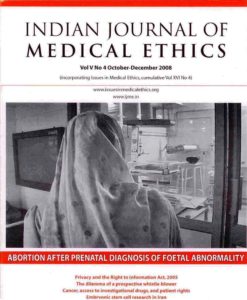
If a woman chooses to terminate a pregnancy because prenatal diagnosis reveals foetal abnormalities, does this threaten disability rights? The editorial reflects on the story of Niketa Mehta who went to court seeking an abortion in the 23rd week of pregnancy when she learned that the foetus she was carrying had a serious heart problem and would be born with severe disabilities.
Should a doctor speak out against a colleague who has committed a wrong? A physician describes his dilemma with stories of bad practice and asks: should we be more loyal to the profession than to our patients?
The Right to Information Act, 2005, may be seen to threaten the privacy of patients and research subjects, especially those in government institutions. The RTI Act permits disclosure of personal health information to third parties only under unusual circumstances when the larger public interest is properly certified to warrant it. A paper in this issue discusses a legal case that used the RTI Act to expose patient information of a public official.
A writer notes that while scientists and doctors are constantly told that they must not involve themselves in politics, there are some issues on which all citizens with a conscience must take a position, and the medical profession must take a lead in the opposition to nuclear weapons.
Other essays in this issue discuss patients’ rights and patient protection in cancer research in the US and India, principles behind surrogate decisionmaking in end-of-life care, and the development of embryonic stem cell research in Iran. Finally, members of ethics review committees grapple with the challenges of reviewing trials of traditional medicines.
Cover photograph: Surabhi Sharma
